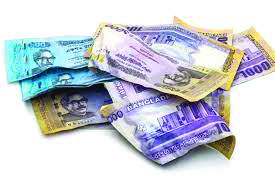Pvt sector credit flow under pressure
Price hikes and devaluation
Golam Mostafa Jibon: Widespread global inflation and local currency exchange rate depreciation have had an adverse impact on the country’s private sector credit flows.
Such a picture has emerged in a survey of the central bank. But the country’s policy makers have advised restraint to come out of the current situation.
The sector has been negatively affected by the fixation of interest rates on deposits and loans of non-banking financial institutions. These institutions are losing deposits after fixing interest rates. In the last one year, the deposits of financial institutions have decreased by over Tk 1,000 crore.
According to the latest report of Bangladesh Bank regarding financial institutions, the amount of customer deposits of financial institutions stood at Tk 41,585 crores at the end of July-September quarter of this year. At the same time of last year which was Tk 42,790 crore. As such, deposits in financial institutions have decreased by Tk 1,205 crore in the space of one year.
At the same time, the debt position of financial institutions increased. At the end of the July-September quarter of this year, the amount of disbursed loans of financial institutions stood at Tk 69,306 crore. It was Tk 66,368 crore in the same quarter last year. That means, during this period, the debt status of financial institutions has increased by Tk 2,938 crore.
Relevant sources said, people are keeping less money in this sector after fixing the deposit interest rate of financial institutions. Because, according to central bank rules, financial institutions cannot now pay more than 7 percent interest on deposits. It has reduced people’s interest. However, despite the institutions not getting enough deposits, the loan disbursement does not stop.
Compared to the July-September quarter of last year, the debt status in this sector has increased by about Tk 3,000 crore in the same quarter of this year.
Bangladesh Bank has issued a circular that from July this year, financial institutions can take deposits at a maximum of 7 percent interest. And the maximum interest rate for lending is fixed at 11 percent.
Earlier, in April 2020, Bangladesh Bank fixed the maximum loan interest rate for banks at 9 percent. Although, this rate is not directly determined in the case of deposits, the interest rate on bank deposits is around 6 percent.
Deposit flows have started to decline after financial institution interest rates were fixed. However, the loan balance has increased by about Tk 3,000 crore.
Another reason for the drop in deposits has been pointed out by stakeholders. That is, the irregularities of the country’s financial sector. However, the disbursement of loans in this sector is considered to have increased normally.
Meanwhile, last September, the central bank in a new policy allowed the customers of financial institutions to reschedule any loan up to four times. Loan repayment can be deferred for six months. Earlier the loan could be rescheduled three times and there was no break in repayment.
M Jamal Uddin, Managing Director of IDLC Finance said, “Despite the decrease in deposits of financial institutions overall, we had 6-7 percent growth in the last quarter. During this period IDLC’s loan growth has been as high as 15 percent. And as a result of fixing the interest rate, even though there are some problems in this sector, there is no shortage of deposits in the institutions which have good governance or who have good reputation.”
According to Central Bank data, there are currently 304 branches of 34 financial institutions across the country. There are 280 branches in cities and 24 in rural areas. Apart from this, there are 5,70,196 accounts in 34 financial institutions.
The divisional analysis shows that the financial sector deposits have increased in Chattogram, Rajshahi, Barishal, Sylhet and Rangpur divisions. However, deposits have decreased by 1.30 percent in Dhaka, 10.15 percent in Khulna and 2.46 percent in Mymensingh. In addition, 35.14 percent of disbursed loans went to industry; 31.13 percent in trade and 17.59 percent in consumer sector.
Financial institutions can take deposits for a minimum period of three months. Still most of the country’s financial institutions take loans from banks. The more individual and institutional deposits among them, the better off they are.
According to a Bangladesh Bank survey, the current private-sector-credit growth is about 14 percent. But if there is no depreciation of the Bangladeshi Taka against the US dollar, it can stand at around 11 percent.
Dr. Zahid Hussain, former Chief Economist of the World Bank said, “Global price hikes and devaluation of the dollar have fueled inflation.”
Private credit will not expand as long as there is inflation. And he suggested easing the interest rate regime for lending to the private sector.
Chairman of Policy Exchange of Bangladesh Masroor Riaz said,”Bangladesh Bank’s argument is unsound, as the comparison between private-sector-credit growth and dollar rates is not logical.”
He also felt that the growth of private credit should have been curtailed as it helped fuel inflation in the economy.
Rare Israeli airstrike in Beirut kills Hezbollah commander and more than a dozen others
International Desk: Israel launched a rare airstrike that killed a senior Hezbollah milita…








